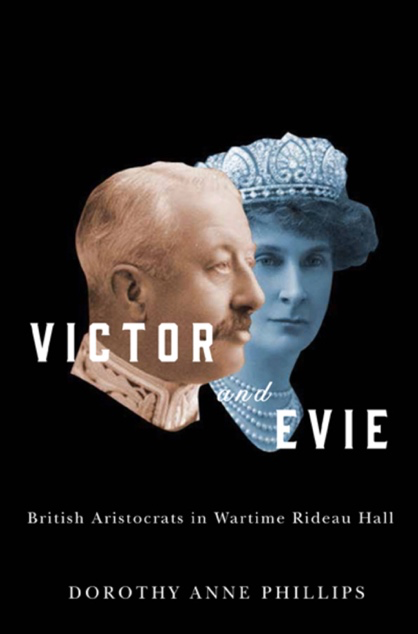Victor and Evie: British Aristocrats in Wartime Rideau Hall

~ Report by Myra McFarlane ~
April, 2021
On April 21st members and friends of RTHS were treated to a talk by Dorothy Anne Phillips about her book:
Victor and Evie: British Aristocrats in Wartime Rideau Hall.
Given that we are currently between Governors General, Ms. Phillips’ talk could not have been more timely. And the lively question and answer period that followed the talk helped illustrate the relevance of the subject matter.
Interestingly, in 1916, when the Duke and Duchess of Devonshire were chosen to come to Rideau Hall, the Canadian Government was not even formally consulted! In 1916, in the midst of the First World War, the choice of a Governor General for Canada was of strategic importance.
The Duke of Devonshire arrived with his wife the Duchess known as Evie and two of their seven children - the daughters who were the most marriageable - Maude who was 20, and Blanche who was 18. The four youngest children would follow later; the eldest son “Eddie” was stationed in Paris after having been wounded on the battlefield.
Like all families who leave home, even if only for a limited period of time, the Devonshires left unfinished business. Both Victor’s and Evie’s parents were elderly, four of their children were left behind for the time being, and the business interests of the family would have to be managed remotely. Additionally, while the assignment in Canada could be a career making move for someone such as the Duke, Canada, if not handled properly, could also derail it. Evie did not want to come; but like a dutiful wife she made the best of it - and she had the added good luck of having lived in Canada as a child, while her father (Lord Landsdowne) had been the Governor General from 18831888.
When the new Governor General arrived in 1916, he was confronted almost immediately with the issue of how the semiannual honours list was to be composed. There was a strict communications protocol and strict guidelines as to who could be recommended; unfortunately, by the time Devonshire arrived, both the communications protocol and the selection guidelines had been circumvented so that Sir Hugh Graham could be given a baronetcy. To his credit, the new Governor General realized that the ship of the baronetcy had mostly sailed, and while the end result was not completely satisfactory for any of the parties, it was a decent compromise, and the Duke and Sir Robert Borden were able to work well together for the entire five year term.
The story of the honours, well-illustrated by Ms. Phillips in her talk, shows us the delicate dance that was the every day life of the Governor General in wartime Canada, as Canada moved closer and closer to full independence.
While Victor was astutely threading the political needle, Evie, who was as reserved as Victor was outgoing, was making a home for her family in Rideau Hall and assuring her daughters’ future happiness. By April 1920, three of the daughters were married: Maude had married Angus Mackintosh, one of the original aides de camp, Blanche had married Ivan Cobden in England, and Dorothy had married one Harold MacMillan. In each case it was Evie who negotiated the marriage agreements.
The family loved the outdoors. And this is where the story of the Devonshire family and that of our author come together. In 1918/19 the family was looking for a place to build a summer home and found Blue Sea Lake in the Gatineau. Many many years later, Ms. Phillips was staying with friends at that very same lake and heard the story of the summer home built by the Governor General and his family. Her curiosity was piqued. Today the 92 acre property that the Devonshires bought and sold has been divided and the house no longer stands.
What remains are the remnants of the train station, a blue church, and a path. And memories and stories. Personal and political… Affairs of the heart and affairs of state.
It was that visit to the lake that led Ms Phillips on her journey of discovery, to our own Library and Archives of Canada, and to the archives at Chatsworth the seat of the Devonshires, not to mention a series of local and provincial archives. Dorothy found family letters and got to know Victor and Evie and their relations. Through those letters she was able to understand how the personal and the political merged to create what is really a very Canadian story.
Thank you Dorothy Phillips for all your work, your wonderful talk, and we can’t wait to see the next book. We will be patient.
